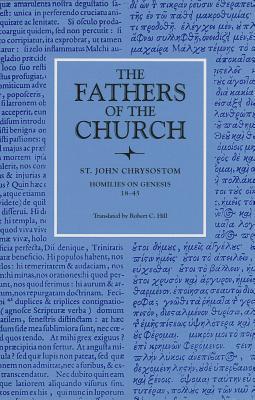Homilies on Genesis, 18-45
by John Chrysostom
John Chrysostom, called the "golden-mouthed" for his eloquent preaching, continues in this second volume of the sixty-seven Genesis homilies to provide instruction for the moral reformation of the Christians of Antioch. He continues in Homily 18 with Genesis 3 and finishes in Homily 45 with Genesis 20. They seem to have been delivered perhaps as early as 385, half just before and during Lent and the remainder, from Homily 33 onward, after Pentecost.
That Chrysostom favored Antiochene exegesis is clear from his exhortation at the beginning of Homily 20 to "take up the thread of the reading and apply...the teaching from the passage." "You see," he writes, "there is not even a syllable or even one letter contained in Scripture which does not have great treasure concealed in its depth." He artfully interprets the literal spiritual meaning of this treasure for his congregation through inspiring and colorful exegesis.
It was Chrysostom's pastoral responsibility to guide his congregation by means of homiletic exegesis. He urged his listeners to take note of the instruction and to give attention to the correction of their own daily lives so as to "proceed to the enjoyment of salvation." The theme of the good man Noe, who remained unaffected by the universal decline of mankind into wickedness, provides the example for the moral improvement of his listeners in Homilies 23-29, as does the hospitality of Abraham in Homilies 41-45.
The Genesis homilies reveal Chrysostom as commentator, preacher, moralist, and profoundly theological and precise exegete of Scripture, the truth of which he teaches for the betterment of this congregation.
That Chrysostom favored Antiochene exegesis is clear from his exhortation at the beginning of Homily 20 to "take up the thread of the reading and apply...the teaching from the passage." "You see," he writes, "there is not even a syllable or even one letter contained in Scripture which does not have great treasure concealed in its depth." He artfully interprets the literal spiritual meaning of this treasure for his congregation through inspiring and colorful exegesis.
It was Chrysostom's pastoral responsibility to guide his congregation by means of homiletic exegesis. He urged his listeners to take note of the instruction and to give attention to the correction of their own daily lives so as to "proceed to the enjoyment of salvation." The theme of the good man Noe, who remained unaffected by the universal decline of mankind into wickedness, provides the example for the moral improvement of his listeners in Homilies 23-29, as does the hospitality of Abraham in Homilies 41-45.
The Genesis homilies reveal Chrysostom as commentator, preacher, moralist, and profoundly theological and precise exegete of Scripture, the truth of which he teaches for the betterment of this congregation.
BUY NOW
Paperback, 494 pages
Published February 1st 2001 by Catholic University of America Press (first published January 1st 1985)
© 2025 Bibleportal.com 版权所有.

John Chrysostom (349 - 407)
Read freely text sermons and articles by the speaker John Chrysostom in text and pdf format Archbishop of Constantinople, was an important Early Church Father. He is known for his preaching and public speaking, his denunciation of abuse of authority by both ecclesiastical and political leaders, the Divine Liturgy of St. John Chrysostom, and his ascetic sensibilities. The epithet Χρυσόστομος (Chrysostomos, anglicized as Chrysostom) means "golden-mouthed" in Greek and given for his celebrated eloquence.The Eastern Orthodox and Byzantine Catholic churches honor him as a saint and count him among the Three Holy Hierarchs, together with Basil the Great and Gregory Nazianzus. He is recognized by the Eastern Orthodox Church and the Catholic Church as a saint and as a Doctor of the Church. Churches of the Western tradition, including the Roman Catholic Church, some Anglican provinces, and some Lutheran churches, commemorate him on 13 September. Some other Lutheran churches and Anglican provinces commemorate him on the traditional Eastern feast day of 27 January. Chrysostom's extant homiletical works are vast, including many hundreds of exegetical homilies on both the New Testament (especially the works of Saint Paul) and the Old Testament (particularly on Genesis). Among his extant exegetical works are sixty-seven homilies on Genesis, fifty-nine on the Psalms, ninety on the Gospel of Matthew, eighty-eight on the Gospel of John, and fifty-five on the Acts of the Apostles.
John Chrysostom, Archbishop of Constantinople, was an important Early Church Father. He is known for his eloquence in preaching and public speaking, and his denunciation of abuse of authority by both ecclesiastical and political leaders.
Chrysostom is known in Christianity chiefly as a preacher, theologian and liturgist, particularly in the Eastern Orthodox Church.
During a time when city clergy were subject to criticism for their high lifestyle, John was determined to reform his clergy in Constantinople. These efforts were met with resistance and limited success. He was an excellent preacher. As a theologian, he has been and continues to be very important in Eastern Christianity, and is generally considered the most prominent doctor of the Greek Church, but has been less important to Western Christianity.
His writings have survived to the present day more so than any of the other Greek Fathers. He rejected the contemporary trend for allegory, instead speaking plainly and applying Bible passages and lessons to everyday life.
... Show more